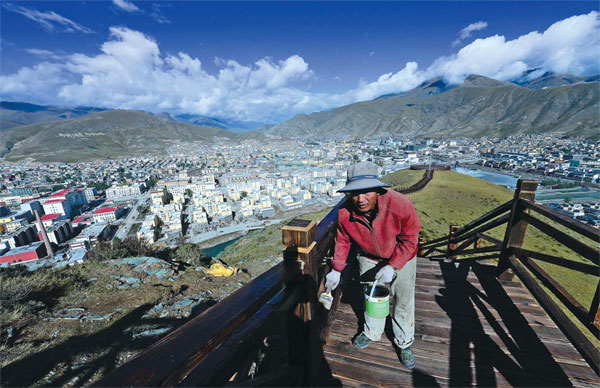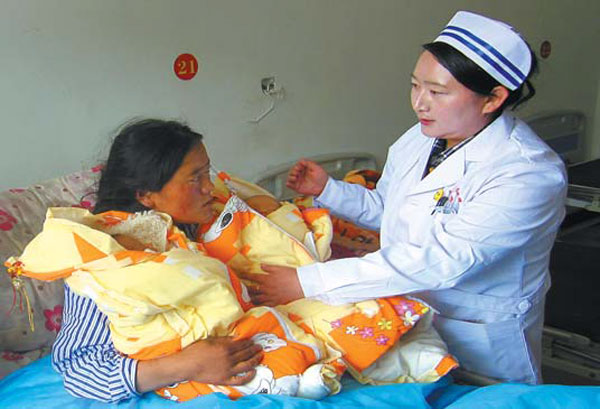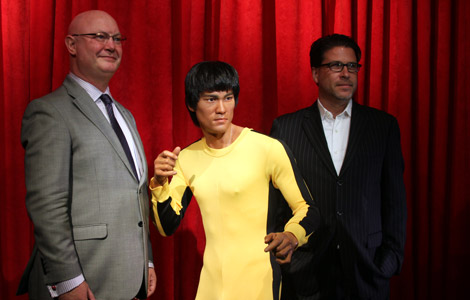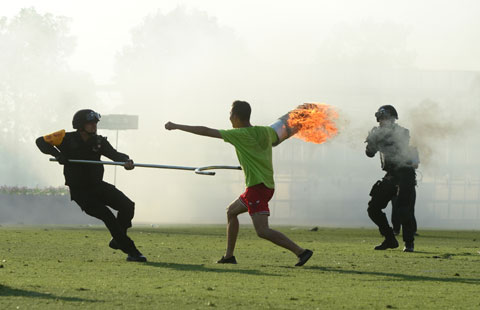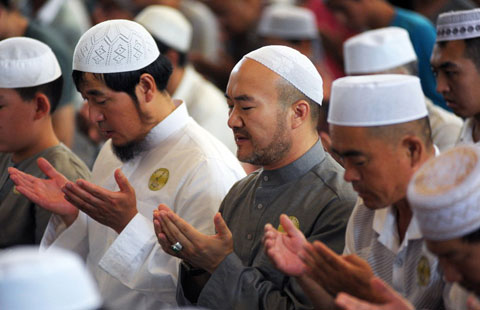Rebuilding lives
Updated: 2014-08-19 06:51
By Yang Wanli(China Daily)
|
||||||||
Four years on, residents of quake-hit Yushu are receiving support to recover from the disaster but more is needed, reports Yang Wanli in Yushu, Qinghai province.
Kargu, a resident of the Yushu Tibetan autonomous prefecture in Qinghai province, gave birth to nine children at home.
"Herdsmen camp anywhere, following the grasslands with our yak and sheep. We have been accustomed to delivering our babies at home, even in tents," the 47-year-old said.
|
A worker paints a staircase at Dangdai Mountain in Jiegu township of Yushu in September. The area behind him took on a new look after rebuilding efforts. Zhang Hongxiang / Xinhua |
|
Pupils of the First Wanquan Primary School in Yushu attend a Chinese language class on March 10. The city's primary and middle schools started their first full semester this year after the earthquake in 2010. Wu Gang / Xinhua |
|
A medical worker at the Dzatod County People's Hospital in Yushu on Aug 6 attends to 23-year-old Gartsok and her newborn twins. Yang Wanli / China Daily |
But when Kargu's own daughter Gartsok, 23, was pregnant with twins, doctors said both the babies were lying in difficult positions and needed medical attention.
So on July 30, Gartsok gave birth to the boys in the Dzatod county hospital in Yushu.
Kargu was with her daughter that day, and it was the first time for her to witness a woman giving birth in a hospital.
"Without the improvement of medical services in the county, my daughter might not have had her two sons safely," Kargu said.
Located at an average altitude of 4,200 meters, Yushu is linked to the Tibetan plateau and covers about 720,000 square kilometers with a population of about 5.7 million. Half of its residents include those from the Tibetan, Hui and Mongolian ethnic groups.
The sparsely populated prefecture has had few links with the more developed areas in central and western China. Most of its counties are connected with one-lane roads that snake through mountainous areas and turbulent rivers.
On April 14, 2010, a magnitude-7.1 earthquake hit Yushu city, the prefecture's capital, killing 2,698 people with 270 others still missing. Dzatod, about 250 km from the prefecture's capital, was also severely damaged in the quake.
Reconstruction and rebuilding efforts following the disaster have since helped to improve the lives of residents like Kargu and her family.
The county's hospital used to be in a single-storey brick house before the earthquake. It was the biggest hospital serving all 40,000 residents but had no more than 10 beds for patients.
"There were no separate departments in the hospital. A woman who gave birth would share the room with a patient who broke his knee," said Trashi Lhamo, assistant to the hospital chairman.
The scale and facilities of the hospital before the quake were no better than that of a residential medical center in a district in Beijing.
But after the tremor struck, the Red Cross Society of Shanxi province donated about 30 million yuan ($4.88 million) to rebuild the county's hospital with new facilities and medical equipment.
The hospital now boasts a three-storey building covering 4,000 sq m and 30 beds. New mothers like Gartsok can enjoy a good rest with her babies in a room for new mothers. A doctor will visit her three times a day, checking both her health and the condition of the babies.
"I will recommend my sisters to deliver in the hospital, whether their medical conditions are normal or complicated," Gartsok said.
Yushu enjoys only four months of warm days in the whole year, with the highest temperature at about 20 C in the day. The rest of the days are cold and there are still no electrical or water heating systems in many homes.
"The inpatient rooms in the new hospital have air conditioners. It is much more comfortable to give birth here," Gartsok said.
With medical insurance, patients need to pay only about 20 percent of all medical costs. Gartsok, who went through c-section surgery and stayed in the hospital for eight days, paid no more than 1,000 yuan for the treatment, an amount similar to about one month's average income for a worker in the county.
Helping hands
A total of 2.6 billion yuan was donated to the Red Cross Society of Qinghai for rebuilding work after the quake, which formed a major part of the prefecture's rebuilding budget, figures from the Red Cross Society of China showed.
About 2.3 billion yuan of the donations came from the Red Cross Society of China. About 2 billion yuan of the funds for some projects remain under construction.
The donations covered a total of 94 reconstruction projects, among which 75 have been put into use.
Residents were in crucial need of healthcare services following the quake and 45 of all rebuilding projects are related to medical facilities such as hospitals in the cities and counties as well as clinics in the townships.
Yushu Prefecture People's Hospital in Yushu city is the largest hospital in the prefecture. The hospital's old building was leveled in the earthquake and it was rebuilt on the original site in 2010. With a 184 million yuan donation from the Aluminum Corporation of China, the hospital now includes a new building covering 32,300 sq m.
"The new facility is five times bigger than the old one. It's also the first time for us to have a real emergency department," said Liang Xiuyin, 40, head nurse of the emergency department.
Liang said the new hospital also boasts facilities like nuclear magnetic resonance and CT scanning machines. Before that, patients who needed related medical checks had to go to Xining, the provincial capital, which lies 800 km in the northeast of Yushu.
Liang said the prefecture opened its first airport in 2009.
"Before that, the only way to go to Xining was by bus, which took about 18 hours. In the 1990s, traveling by bus between the two places took two days," she said.
"We even didn't have an ambulance, just two minivans for the emergency cases. The only medical equipment in them were stretchers," she said.
"Hundreds of patients who were severely injured in the earthquake were lying in the tents in the garden of the hospital. The building collapsed and we could not provide better conditions."
The new emergency department has 18 employees and five ambulances. Liang and her other colleagues also have more opportunities to learn from doctors from the country's top hospitals.
She visited the Beijing Emergency Treatment Center in May 2012 and learned the latest emergency rescue techniques for three months.
Liang said she lost a number of family members in the quake and times were tough in the immediate aftermath of the disaster.
"Things have been getting better in the past four years. Early after the earthquake, we rarely smiled," Liang said.
"But life should move on. I used to admire the good facilities and working circumstances in Xining. Now we also have those. During our visits to Beijing, the strong feelings of being cared for and loved also inspired me. You can see smiles returning to our faces," she said.
Giving hope
About one km from Yushu Prefecture People's Hospital, 1,716 children are having lessons in the new Yushu No 1 Primary School. The school started in 1929 as the first primary school providing Mandarin lessons in the south of Qinghai.
Most schools in Yushu collapsed or became unsafe because of the quake and 32 of them, including Yushu No 1 Primary School, have been rebuilt.
The construction of the school was completed in 2012 with the 44 million yuan donation from the Red Cross Society of Jiangsu province.
Students now enjoy a 400-meter running track and a football field for the first time. More than 10 classrooms were added. A new library, basketball field and computer learning classes are also available.
"The facilities in most schools in Yushu used to be very outdated. Physical education classes were just about students playing the basic games they knew outside school," said Sang Liao, a PE and math teacher in Yushu No 1 Primary School.
The school also used the donations to buy 40 electronic organs for many students to acquaint themselves with musical instruments and create their own music.
"Music teachers only taught students singing in the past. We wanted to bring more happiness to the students and give them opportunities to nurture their creativity. The funds allowed us to do that," said Kunga Tenchou, president of the school.
"Music and sports have helped those students affected by the quake to recover from the shock and sadness. They have brought back some vitality in the school and given hope to the children."
Remaining challenges
The new and better-constructed buildings and homes in Yushu are helping quake-hit residents to recover from the disaster.
But some rural areas still face challenges like power shortages because of the difficult terrain.
In Dritod county, a maternal and child care service center began operations at the end of 2013. The center is the county's first such facility for women and children.
There are 10 rooms and 30 beds for patients. Five doctors and nurses work in the center.
"The power supply in many counties in Yushu mainly depends on small hydropower stations. But the power suffers outages and can't support the running of some medical equipment during the dry season," said Jia Ying, director of the center.
The center bought five power generators to help maintain the equipment, Jia said, but two generators are not working and need to be repaired.
"Transportation in Yushu is in very poor condition. We lack technicians. Medical professionals are also in short supply. The high altitude and poor economic conditions have deterred many new medical graduates from coming," she said.
Education and care for women and children's health are also inadequate in many counties in Yushu, Jia said.
Dzatod county's first maternal and child care service center was also built last year and will be utilized in a few months. Women like Gartsok have little knowledge about gynecological issues, or even basic knowledge about contraception.
"Such service centers are in great demand here. Women should know more about their health and the health of their children," Jia said.
"Support for healthcare and other basic resources, as well as professionals, are still very much needed here."
Contact the writer at yangwanli@chinadaily.com.cn
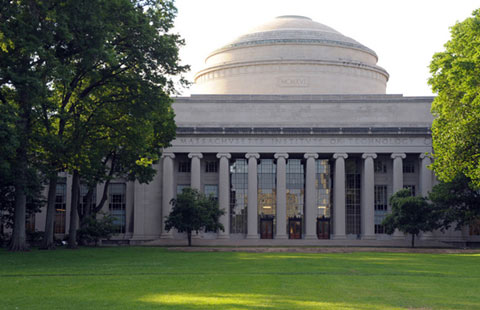
 US dominates Chinese world university rankings
US dominates Chinese world university rankings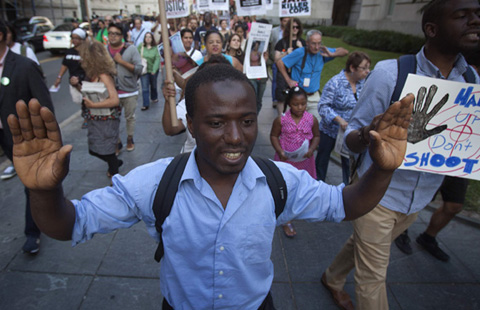
 Missouri governor lifts Ferguson curfew
Missouri governor lifts Ferguson curfew
 Residents caught giant alligator in Alabama
Residents caught giant alligator in Alabama
 Chinese biotech company rings closing bell at NASDAQ
Chinese biotech company rings closing bell at NASDAQ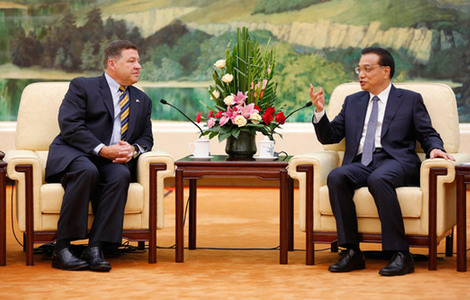
 China can upgrade US transport
China can upgrade US transport
 Jackie Chan's son detained for taking drug
Jackie Chan's son detained for taking drug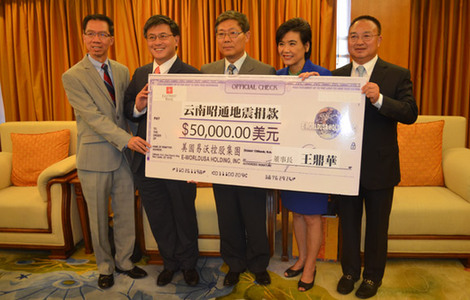
 California Chinese open pockets for quake relief
California Chinese open pockets for quake relief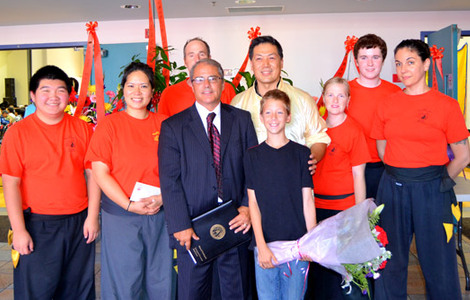
 Showing their skills
Showing their skills
Most Viewed
Editor's Picks

|

|

|

|

|

|
Today's Top News
Antitrust probes 'won't deter investors'
Obama vows long-term strategy against ISIL
Ministry says trade growth needs help to reach 7.5%
Xi pledges to make China media more up to date
Missouri gov lifts Ferguson curfew
US police uses China's social media
China's US debt holdings dip lower, again
Anti-trust team lacks real muscle for enforcement
US Weekly

|

|
